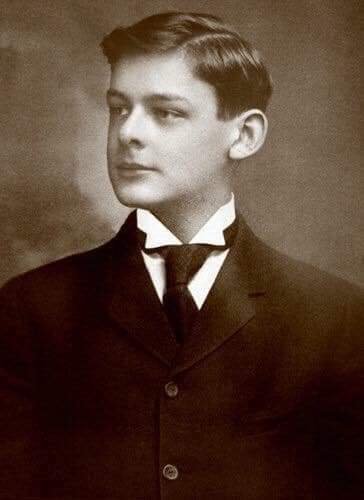Peter Arckroyd book T.S Eliot: An Imperfect Life
On this day in 1948, T.S. Eliot wins the Nobel Prize in literature, for his profound effect on the direction of modern poetry.
When T. S. Eliot died, wrote Robert Giroux, "the world became a lesser place." Certainly the most imposing poet of his time, Eliot was revered by Igor Stravinsky "not only as a great sorcerer of words but as the very key keeper of the language." For Alfred Kazin he was "the mana known as 'T. S. Eliot,' the model poet of our time, the most cited poet and incarnation of literary correctness in the English-speaking world." Northrop Frye simply states: "A thorough knowledge of Eliot is compulsory for anyone interested in contemporary literature. Whether he is liked or disliked is of no importance, but he must be read."
In 1945 Eliot wrote: "A poet must take as his material his own language as it is actually spoken around him." Correlatively, the duty of the poet, as Eliot emphasized in a 1943 lecture, "is only indirectly to the people: his direct duty is to his language, first to preserve, and second to extend and improve." Thus he dismisses the so-called "social function" of poetry. The only "method," Eliot once wrote, is "to be very intelligent." As a result, his poetry "has all the advantages of a highly critical habit of mind," writes A. Alvarez; "there is a coolness in the midst of involvement; he uses texts exactly for his own purpose; he is not carried away. Hence the completeness and inviolability of the poems. What he does in them can be taken no further.... [One gets] the impression that anything he turned his attention to he would perform with equal distinction." Alvarez believes that "the strength of Eliot's intelligence lies in its training; it is the product of a perfectly orthodox academic education." But Jacques Maritain once told Marshall McLuhan that "Eliot knows so much philosophy and theology that I do not see how he can write poetry at all." Eliot, however, never recognized a conflict between academic and creative pursuits.
Of his early work, Eliot has said: "The form in which I began to write, in 1908 or 1909, was directly drawn from the study of Laforgue together with the later Elizabethan drama; and I do not know anyone who started from exactly that point." Elsewhere he said: "The kind of poetry that I needed, to teach me the use of my own voice, did not exist in English at all; it was only found in French," and Leonard Unger concludes that, "insofar as Eliot started from an exact point, it was exclusively and emphatically the poetry of Laforgue." To a lesser extent, he was influenced by other Symbolists, by the metaphysical poets, by Donne, Dryden, and Dante. "His appreciation of Shakespeare," writes Sir Herbert Read, "was subject to his moral or religious scruples." With Samuel Johnson, whom, according to Sir Herbert, Eliot "honoured above all other English writers," he shared "a faith in God and the fear of death.
It is said that the novelties he introduced—none more striking than the reappearance of ideas in poetry—have been assimilated and become part of that marvelous order, now slightly altered, of imperishable works in English." Frank Kermode adds: "Eliot certainly has the marks of a modern kind of greatness, those beneficial intuitions of irregularity and chaos, the truth of the foul rag-and-bone shop. Yet we remember him as celebrating order. Over the years be explored the implications of his attitudes to order, and it is doubtful whether many people capable of understanding him now have much sympathy with his views. His greatness will rest on the fruitful recognition of disorder, though the theories will have their interest as theories held by a great man." And Scott-James has said that Eliot "brought into poetry something which in this generation was needed: a language spare, sinewy, modern; a fresh and springy metrical form; thought that was adult; and an imagination aware of what is bewildering and terrifying in modern life and in all life. He has done more than any other [contemporary] English poet to make this age conscious of itself, and, in being conscious, apprehensive."
Mouna Bou Antoun
The research is based on:
Source:
www.eliotsociety.org.uk
Posted using Partiko Android

Congratulations @rishurtss! You have completed the following achievement on the Steem blockchain and have been rewarded with new badge(s) :
You can view your badges on your Steem Board and compare to others on the Steem Ranking
If you no longer want to receive notifications, reply to this comment with the word
STOPDo not miss the last post from @steemitboard:
Vote for @Steemitboard as a witness to get one more award and increased upvotes!
Thank you so much for being an awesome Partiko user! We have just given you a free upvote!
The more Partiko Points you have, the more likely you will get a free upvote from us! You can earn 30 Partiko Points for each post made using Partiko, and you can make 10 Points per comment.
One easy way to earn Partiko Point fast is to look at posts under the #introduceyourself tag and welcome new Steem users by commenting under their posts using Partiko!
If you have questions, don't feel hesitant to reach out to us by sending us a Partiko Message, or leaving a comment under our post!